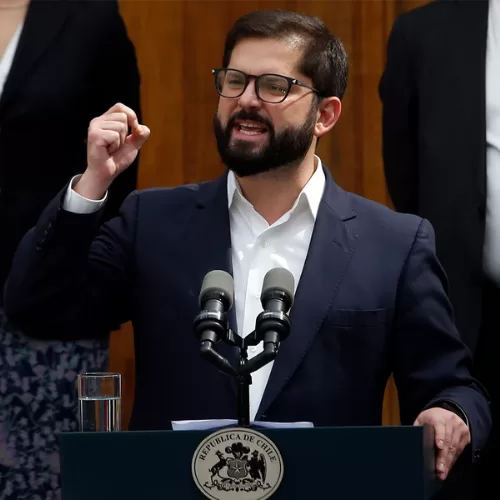Chile has taken a major diplomatic step by pulling its military attachés out of its embassy in Tel Aviv. This decision was made jointly by the Ministry of Foreign Affairs and the Ministry of Defense, and it comes as a response to Israel’s actions in Gaza. According to the Chilean government, Israel has carried out “disproportionate and indiscriminate” military operations, and has blocked humanitarian aid from reaching civilians.
The officials withdrawn include Chile’s military, defense, and air attachés—key figures who coordinate security and defense matters between the two nations. Chile stated that its move is based on humanitarian principles and a commitment to international law.
This action is the latest in a series of steps by President Gabriel Boric’s government showing increasing distance from Israel. Since taking office in 2022, Boric has delayed the accreditation of the Israeli ambassador, barred Israeli companies from the 2024 FIDAE aerospace fair, and recalled Chile’s ambassador from Tel Aviv. The post remains unfilled. Now, with Chile’s president expected to deliver his major annual “Cuenta Pública” speech before Congress, there is growing speculation that he may announce a full diplomatic break with Israel.
President Trump’s Administration Weighs Heavy Response
In Washington, President Donald Trump’s administration is preparing a strong response. A senior official from within the administration told The Media Line that the U.S. is considering a range of retaliatory actions against Chile, warning that “everything is on the table.”
Among the possible measures being considered against Chile:
- Removing it from the U.S. Visa Waiver Program, which currently allows its citizens to visit the United States without a visa for short stays.
- Increasing tariffs on exports, potentially impacting key goods like fruit, wine, and copper.
- Suspending visa interviews for students, limiting opportunities to study in the U.S.
- Potentially closing the U.S. consulate in Santiago, the nation’s capital.
If Chile is removed from the Visa Waiver Program, it would become the only country in South America’s Southern Cone to lose that privilege. That alone would mark a serious diplomatic rift between the two nations.
‘Enough Is Enough’: EU Considers Sanctions on Israeli Settlers for Systematic Abuses
During a May 28 speech at the International Conference on Combating Antisemitism—hosted by Israel’s Foreign Ministry—Secretary of State Marco Rubio gave clear support to Israel. “The United States will stand with the Jewish people,” Rubio said. He also announced a “vigorous new visa policy” to block foreign nationals who spread hatred against Jewish communities from entering the U.S.
The Trump administration is reportedly considering measures similar to those it took earlier this year against Colombian President Gustavo Petro, who severed diplomatic ties with Israel.
Chile’s Move Adds to Regional Tensions
Chile’s possible diplomatic break with Israel comes as part of a broader shift among some South American countries. Bolivia, for example, has reportedly signed new weapons deals with Iran. Chile joining that path would deepen a trend of distancing from Western allies, especially in defense and diplomatic matters.
While President Boric’s government insists that its stance is guided by respect for humanitarian law and human rights, the response from Washington suggests a rapidly deteriorating relationship. Chile’s Ministry of Foreign Affairs has emphasized its commitment to ensuring humanitarian aid reaches Gaza and that civilian lives are protected.
With President Boric’s national speech broadcast across the country, all eyes are on whether Chile will indeed take the final step of cutting ties with Israel—an action that could spark further U.S. sanctions under President Trump’s leadership.


